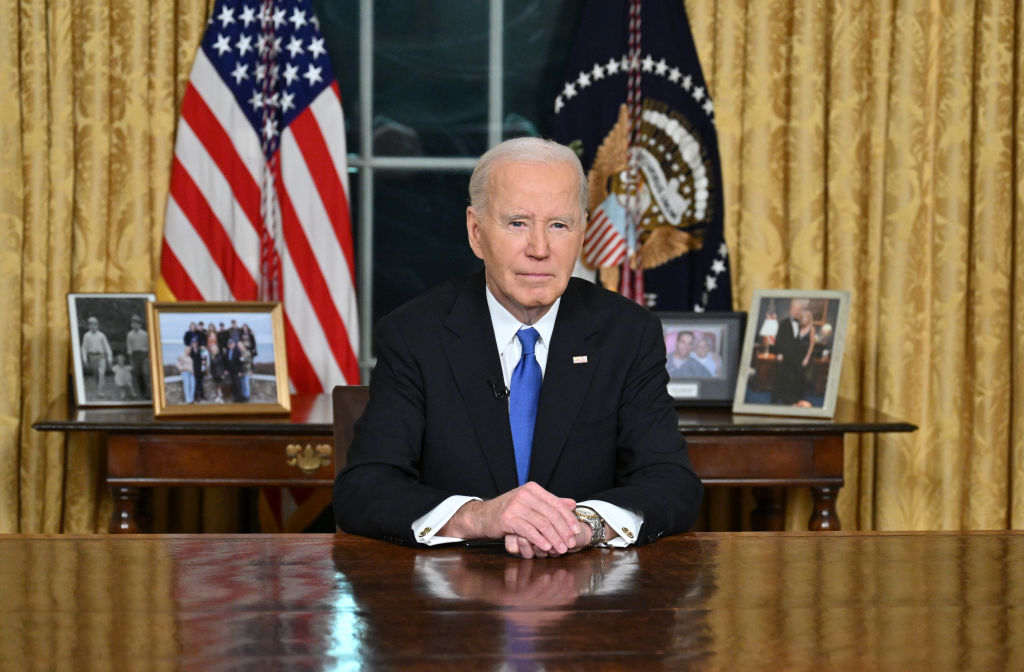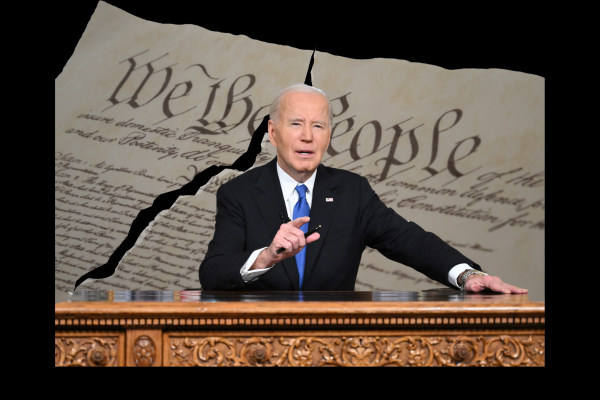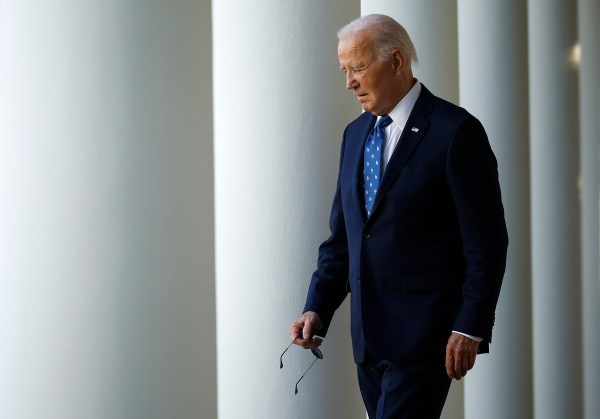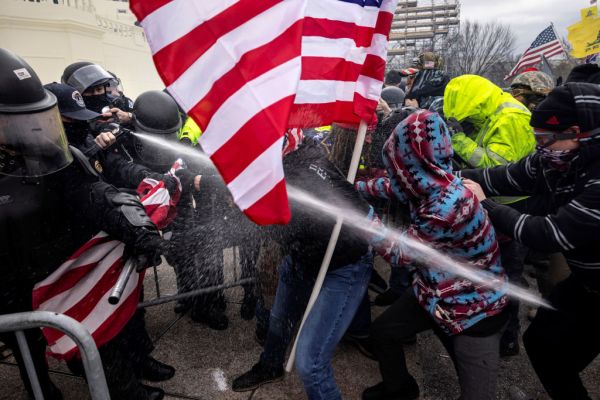Happy Monday! Donald Trump is set to be inaugurated in a ceremony today that, for the first time since 1985, will be held indoors. Officials say the move is due to the “sub-freezing temperatures” in Washington, D.C., but we’re hoping it’s actually because the president-elect is planning an entrance we’ll remember forever.
Quick Hits: Today’s Top Stories
- The first phase of a U.S.-brokered ceasefire and hostage release deal between Israel and Hamas took effect on Sunday, as Israelis celebrated the release of three women—Romi Gonen, Emily Damari, and Doron Steinbrecher—from terrorist captivity after more than 470 days. The Red Cross retrieved the abductees from Gaza City before handing them off to Israeli troops, who transferred the women to a military base to reunite with their mothers. Another group of hostages is set to return home on Saturday as part of Hamas’ gradual release of 33 captives, dead and alive, over a six-week period. On Monday morning, Israel freed 90 Palestinian prisoners and detainees—the first of roughly 1,900 slated to be released over the next six weeks—into the West Bank and East Jerusalem. In protest of the deal, Israeli National Security Minister Itamar Ben-Gvir followed through on a threat to pull his far-right Otzma Yehudit party from Prime Minister Benjamin Netanyahu’s coalition, but its departure alone will not topple the government.
- A South Korean court on Sunday formally arrested the country’s impeached President Yoon Suk Yeol on insurrection and abuse of power charges, extending his detention to 20 days and sparking violent protests outside the Seoul Western District Court. Demonstrators smashed windows and doors to break inside, ransacking the courthouse and demanding to see the judge who issued the warrant. Police have arrested nearly 90 protesters so far. When issuing the arrest warrant, which allowed authorities to continue to hold Yoon after he was apprehended last Wednesday, the court cited the risk that the president could destroy evidence. If public prosecutors indict Yoon in the next 20 days, he could remain in prison for up to six months.
- TikTok is live again in the United States after briefly going dark Sunday morning in compliance with the Supreme Court’s unanimous decision to uphold a law effectively banning the popular social media app. The reversal came after President-elect Donald Trump announced on Truth Social that he would be issuing an executive order extending the time before the law takes effect, saying he “would like the United States to have a 50% ownership position in a joint venture.” Even though the app is functional for users who have it installed, Apple and Google have still not added TikTok back to their respective app stores.
- President Joe Biden on Friday commuted the sentences of nearly 2,500 nonviolent drug offenders, setting the presidential record for individual pardons and commutations issued. Two days later, the president pardoned five people—including the deceased black nationalist leader Marcus Garvey—and commuted the sentences of two others on Sunday, but stopped short of issuing rumored preemptive pardons for potential targets of the incoming Trump administration. Other notable pardons on Sunday included the erasure of the 1994 drug possession conviction of current Virginia House of Delegates Speaker Don Scott and the 2006 fraud conviction of immigrant rights activist Ravi Ragbir.
- Firefighters made further progress in containing wildfires in the Los Angeles area over the weekend, as the region braces for “red flag” fire danger warnings with the return of high winds this week. The two largest fires, the Palisades and Eaton fires, were 56 percent and 81 percent contained, respectively, as of Monday morning. Strong Santa Ana winds are expected to return to Southern California beginning on Monday, leading the National Weather Service to issue its highest-level “particularly dangerous situation” alert. About 39,000 people remained under evacuation orders as of Sunday morning.
- President-elect Donald Trump on Friday began selling his own cryptocurrency, $TRUMP, which by Sunday morning was trading at nearly $75. The meme coin quickly broke into the top 20 of all cryptocurrencies, making the incoming president and his companies roughly $58 billion over the weekend as online buyers drove up the value of the digital currency. “It’s time to celebrate everything we stand for: WINNING! Join my very special Trump Community,” Trump wrote in a post announcing the coin’s launch. “Have Fun!”
- Multiple outlets reported Friday that Vivek Ramaswamy—who ran for president in the 2024 Republican primary and was later tapped by President-elect Trump to lead the “Department of Government Efficiency,” or DOGE, with Tesla CEO Elon Musk—plans to run for governor of Ohio. Ramaswamy would reportedly depart from DOGE to pursue a bid to replace Ohio’s Republican Gov. Mike DeWine, who is term-limited. The reports came amid DeWine’s selection on Friday of Ohio Lt. Gov. Jon Husted to take over Vice President-elect J.D. Vance’s U.S. Senate seat, dashing speculation that Ramaswamy would fill the vacancy.
Dark Brandon’s Swan Song

President Joe Biden came into office just days after the nation witnessed the greatest challenge to the peaceful transfer of power since the Civil War. The country remained in the grips of a pandemic that had already killed hundreds of thousands and supercharged political divisions.
Four years ago today, Biden told America in his inaugural address that democracy had prevailed in the face of deep challenges and now it was time to knit back together the national unity that had become so strained under his predecessor. “Today, on this January day, my whole soul is in this: Bringing America together, uniting our people,” he said. He foretold a new chapter in the American story. “The story that tells ages yet to come that we answered the call of history,” he forecasted. “We met the moment. Democracy and hope, truth and justice, did not die on our watch but thrived.”
Biden leaves office painting a much darker image. “Today, an oligarchy is taking shape in America of extreme wealth, power and influence that literally threatens our entire democracy, our basic rights and freedoms and a fair shot for everyone to get ahead,” he said in his farewell address delivered from the Oval Office on Wednesday evening.
The first draft of the history of the Biden administration is now closed, and we don’t pretend to know how the ages will treat the 46th president of the United States. Legacy is a fickle mistress—just ask Ulysses S. Grant or Harry Truman. But what’s clear is the record of Biden’s single term is decidedly mixed, and his presidency failed on its central goal: leading the country out of the Trump era.
Biden and his team have spent much of the last two weeks workshopping their legacy, highlighting the administration’s role in spearheading landmark legislative packages and alliance-building worldwide. Biden released a 26,000-word long letter on Wednesday documenting what he described as the achievements of the last four years.
On the homefront, his administration hit the ground running with the rollout of the COVID-19 vaccine—the development of which by Operation Warp Speed remains one of the signature achievements of the Trump administration. Biden oversaw the execution of a national vaccination program which, despite its faults, helped save hundreds of thousands of lives and set the country on a path out of the pandemic.
But after defeating progressive challengers in the 2020 Democratic presidential primary by running as a centrist, it became clear early in Biden’s term that his ambitions extended beyond just shepherding the country out of the pandemic and away from Trump. Perhaps emboldened by Democratic victories in the runoffs for Georgia’s U.S. Senate seats, Biden opened his ears to the voice of history and began to imagine himself not as a caretaker responsible for preventing another Trump term but as a second FDR.
The seeds of Biden’s political woes were sown early when he and fellow Democrats decided to go big in their first major legislative package, the American Rescue Plan. The nearly $2 trillion law followed more than $3.5 trillion in relief and stimulus doled out in 2020. The measure passed on a partisan vote in the Senate over the protests of Republican lawmakers sounding the alarm on the dangers of runaway spending. A chorus of Democratic economists and former government officials warned the law would boost inflation, too, but Biden administration officials shot down their concerns, arguing the already growing signs of inflation were either transitory or the fault of corporate greed.
Still, there were glimpses of the bipartisan lawmaking that Biden promised. He signed an infrastructure package into law with support from 19 Republican senators that would invest $1 trillion in rebuilding and expanding the country’s roads, railways, bridges, and airports. The CHIPS and Science Act—a law that would provide billions in subsidies and tax credits to promote domestic semiconductor manufacturing—received similar bipartisan support. Biden also signed the first major gun safety legislation in decades that enhanced background checks, incentivized state adoption of red flag laws, and blocked domestic abusers from owning or buying guns.
Those legislative compromises were accompanied by more partisan actions aimed at reshaping the U.S. economy and redefining government social spending. The Inflation Reduction Act (IRA) passed in 2022 via reconciliation included hundreds of billions of dollars in green energy subsidies and health care spending, including Medicare expansions. The president and his allies heralded the IRA, which also included provisions to usher in the clean energy transition, as the largest climate investment in U.S. history. Progressives described the law as a “down payment on the Green New Deal.”
But Biden bungled the implementation of not only the IRA but also some of his other landmark legislative accomplishments. As of last month, the administration had spent less than half of the $1.1 trillion in funds passed for climate, energy, and infrastructure programs, according to an analysis by Politico. And Republicans, now holding a governing trifecta, are eyeing ways to claw back much of the unspent funds.
“I think we would’ve been a hell of a lot better off had we been able to go much harder at getting some of these projects in the ground quicker,” Biden admitted in an interview earlier this month.
The administration’s economic policy strategy was premised on not making the supposed mistake of the Obama administration: failing to go big enough. Spend large in ways that voters can feel—even if it risks running the economy too hot—and they’ll reward you for it at the ballot box. The U.S. did enjoy a better economic recovery than peer nations, and the long-predicted post-pandemic recession has yet to materialize. By metrics like GDP growth, unemployment, and wages, the American economy is in an incredibly strong position. But persistent inflation—fueled, in part, by the administration’s own spending—robbed Biden of the political rewards.
For Biden’s foreign policy record, a politically damaging stain came early with the Afghanistan withdrawal—a move pursued over and against the advice of military leaders that resulted in the deaths of 13 U.S. service members. The president’s approval rating never recovered, and his administration largely refused to countenance any criticism of how the operation was handled.
Overall, Biden believes he’s left America in a better position on the global stage. “Thanks to our administration, the United States is winning the worldwide competition,” he said in remarks delivered at the State Department on Wednesday. “Compared to four years ago, America is stronger, our alliances are stronger, our adversaries and competitors are weaker, and we have not gone to war to make these things happen.”
The president shored up ties with U.S. allies that were damaged under Trump. The North Atlantic Treaty Organization (NATO) —a perennial punching bag of the president-elect—is arguably more unified than at any point since the end of the Cold War. Biden signed the AUKUS agreement, a trilateral pact with Australia and the United Kingdom designed to boost the allies’ combined strength and capabilities in the Indo-Pacific. He bolstered ties with Japan, South Korea, and the Philippines—all key partners in the geopolitical competition with China.
But Biden also leaves office with the world undoubtedly in a more chaotic state, and that—more than Biden’s efforts—may be primarily responsible for those reinvigorated alliances and increased defense spending.
Europe witnessed the start of the largest land conflict since World War II when Russian President Vladimir Putin invaded Ukraine in February 2022, and the Middle East exploded after Hamas carried out the largest slaughter of Jews since the Holocaust. The Biden administration had strong initial responses to both conflicts. The U.S. release of intelligence about Russia’s imminent invasion clarified for the world Putin’s expansionist aims, and Biden helped rally the West to Ukraine’s aid. But the administration fell into a pattern of delaying certain military aid and weapons use permissions only to later acquiesce after Ukraine had suffered for the lack of capabilities.
Similarly, with Israel, Biden demonstrated U.S. solidarity in the wake of October 7 both through the deployment of American forces in the region and the continued flow of military aid and equipment. But as Hamas continued to fight while using civilians as shields and Israel’s operations expanded in Gaza, the casualties rose and humanitarian conditions deteriorated significantly. At times, the administration seemed like it was trying to square a circle between maintaining support for Israel and appeasing left-wing activists who ranged from being highly critical of Israel to openly sympathetic to Hamas.
Critics argued that Biden’s perennial fear of escalation contributed to a breakdown of deterrence when it came to Iran and its terrorist proxies. The U.S. directly intervened to protect Israel from Iranian missile attacks, but it waited to forcefully respond to Iranian proxy attacks on American bases in Iraq and Syria until one killed three American troops. It led a multinational coalition to protect ships transiting the Red Sea from attacks by the Iranian-backed Houthis but failed to deter the group from targeting commercial shipping, allowing traffic through the Suez Canal to drop by some 60 percent.
Still, Biden argued that his administration was key in the weakening of Iran while also preventing the outbreak of a wider war. “Iran is weaker than it’s been in decades,” he said Wednesday. “Israel did plenty of damage to Iran and its proxies. But there’s no question our actions contributed significantly.”
But the outgoing president’s foreign policy legacy, particularly regarding Ukraine, could be undone as a result of Biden’s greatest failure: the return of Donald Trump to the presidency.
With the benefit of hindsight, Biden’s decision to run for a second term likely sealed Trump’s comeback victory. During the 2020 election, Biden pitched himself as the safe port in the storm, but his subsequent mental and physical decline left the public wondering whether he could still steer the ship. The slide to his exit from the race put on full display the president’s pride and stubbornness, and it was left to Democratic party elders to force Biden out of an election that he’s still insisting he could have won.
In his lame duck period, as he did at times throughout his presidency, Biden flouted many of the very norms and institutions he argued Trump threatens. He justified the pardon of his son Hunter Biden by claiming his own Justice Department had been infected by political bias. He opted at the last minute to not enforce the TikTok ban, a measure he signed into law. And last but certainly not least, he unilaterally declared a new constitutional amendment to be the law of the land.
Biden leaves Washington at arguably the lowest point in his political career since the implosion of his first run for the White House 37 years ago. Time could ultimately prove sympathetic to Biden’s record, or it could deliver an even more damning indictment. If the president has taught us anything, it’s that trying to scoop the verdict of history is risky business.
“I believe history will look back on four years of this president and all he embraces as an aberrant moment in time,” Biden said in April 2019 when he announced his presidential campaign. “But if we give Donald Trump eight years in the White House, he will forever and fundamentally alter the character of this nation, who we are.”
Trump is scheduled to be sworn in today at noon.
Worth Your Time
- Reihan Salam, president of the Manhattan Institute, took to the pages of the Economist to argue that the “Paleo-Trumpism” of Donald Trump’s first term has given way to “Neo-Trumpism” going into his second. “Thanks to surging inflation and illegal immigration, and with Mr. Trump growing more moderate on key social issues, many socially liberal voters found themselves ‘mugged by reality’, as the conservative intellectual Irving Kristol once put it. Business leaders, investors, Silicon Valley moguls and academics who once considered Mr. Trump beyond the pale began to reconsider his virtues. The result is a new Trumpian synthesis—call it Neo-Trumpism,” he wrote. “This is a stark departure from Mr. Trump’s first bid for the Republican nomination. Then, he made restricting immigration the centerpiece of his domestic agenda. He jettisoned the free-trade internationalism of George W. Bush and Ronald Reagan in favour of frank protectionism and a more overtly transactional approach to America’s global leadership. … Call this Paleo-Trumpism, both because 2016 is now ancient history and because this ideological synthesis bore a strong resemblance to the paleoconservatism of Pat Buchanan, the Republican rebel who campaigned on protectionism and isolationism in the 1990s, when neoliberal globalism was ascendant on both right and left.”
- In the New York Times, Kyle MacLachlan of Blue Velvet and Twin Peaks fame penned a heartfelt tribute to his longtime friend and mentor David Lynch, who passed away last week. “David was not just a filmmaker: He was a painter, a musician, a sculptor and a visual artist—languageless mediums. When you are outside language, you are in the realm of feeling, the unconscious, waves. That was David’s world. Because there’s room for other people—as the listeners, the audience, the other end of the line—to bring some of themselves,” he wrote. “To David, what you thought mattered, too. With his actors, he didn’t want to give straight direction because he saw us as artists and he knew the process of getting there was part and parcel of the art. With his audience, he was the same way. He valued you, as a unique individual, to make of it what you wished. He was drawn to mystery because he understood mystery as a conversation—a collision of differences, interpretations, perspectives. Not a message sent down from an all-knowing source. A mystery leaves room for other people to get in there. It is two-way communication.”
Presented Without Comment
Donald Trump, discussing repealing President Joe Biden’s executive orders at a rally Sunday night:
Somebody said yesterday, “Sir, don’t sign so many in one day. Let’s do it over a period of weeks.” I said, “Like hell we’re going to do it over weeks. We’re going to sign them at the beginning.”
Also Presented Without Comment
Politico: ‘Lady McBiden’: Alexandra Pelosi Blasts the First Lady
Since breaking her hip in Europe last month, former Speaker Nancy Pelosi has been deluged with messages, flowers and calls of concern from heads of state, colleagues in both parties and even royalty, most notably Luxembourg’s Grand Duke Henri, who was hosting her when she fell and has been solicitous through her recovery.
Yet it’s who she has not heard from that’s most remarkable, and that has infuriated Pelosi’s friends and family: Joe and Jill Biden.
Fueling that anger is Jill Biden’s continued, and now public, nursing of a grudge toward Pelosi for pushing the president to withdraw from last year’s campaign.
“If I was Lady McBiden, I’d put on my big girl pants, play the long game and think about my husband’s legacy,” Alexandra Pelosi, the former speaker’s daughter, told me Saturday. “There aren’t that many people left in America who have something nice to say about Joe Biden and Nancy Pelosi is one of them.” The younger Pelosi made clear she was speaking only for herself.
In the Zeitgeist
Notre Dame is playing Ohio State in the College Football Playoff National Championship tonight, but we can’t let the Fighting Irish make it this far without a clip from Rudy.
Toeing the Company Line
- The Dispatch is hiring! If you’re someone who likes what we’re doing and wants to join the team, we’re looking to bring aboard a chief of staff and a commercial partnerships manager. And if you’re a college student—or know one who might be interested—a reminder that our 2025 summer internship listing is live, too!
- What is Joe Biden’s legacy? What kind of tone did Donald Trump try to strike in his inaugural address—and will it last? What executive orders can we expect in the coming days? Members can join Steve Hayes, Sarah Isgur, Mike Warren, David Drucker, and others on The Dispatch team as they discuss these questions and more on today’s Dispatch Live (🔒). Tune in right after Trump’s inaugural address!
- In the newsletters: Jonah Goldberg wrote about Biden’s attempt to declare the Equal Rights Amendment law by fiat, Nick Catoggio argued that (🔒) the TikTok ban is doomed because America is decadent, and in the latest Dispatch Faith, Jake Meador critiqued Norman Vincent Peale’s bestselling book, The Power of Positive Thinking, and its influence on Donald Trump.
- On the podcasts: Sarah Isgur and David French recorded an emergency episode of Advisory Opinions to discuss the Supreme Court’s handling of the TikTok ban, Jonah Goldberg ruminated on power and corruption, and Michael Reneau interviewed (🔒) Knox Thames on the fate of Syrian religious minorities for The Skiff.
- On the site over the weekend: Geoff Henley wrote about Robert Downey Jr.’s new AI play and Nicole Penn reviewed Jerome E. Copulsky’s new book American Heretics.
- On the site today: Sarah Isgur writes about the “quiet lawlessness” that defined the Biden presidency, John McCormack looks into Trump’s forthcoming pardons of January 6 rioters, and Gil Guerra pens this week’s Monday Essay about the unseen implications of repealing birthright citizenship.
Let Us Know
What do you think are the biggest outstanding questions pertaining to Joe Biden’s legacy? Could the president’s term look better—or worse—with the benefit of hindsight?










Please note that we at The Dispatch hold ourselves, our work, and our commenters to a higher standard than other places on the internet. We welcome comments that foster genuine debate or discussion—including comments critical of us or our work—but responses that include ad hominem attacks on fellow Dispatch members or are intended to stoke fear and anger may be moderated.
With your membership, you only have the ability to comment on The Morning Dispatch articles. Consider upgrading to join the conversation everywhere.